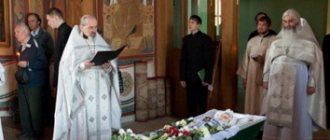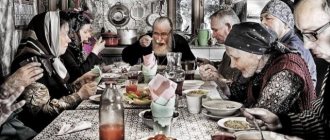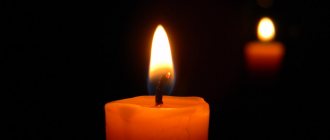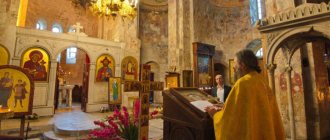Representatives of various faiths live on the territory of Russia, but Orthodoxy remains the most widespread religion. In accordance with church traditions, the funeral of the dead is held on the third day. This custom is based on religious ideas about the path the soul takes after death.
Church and social norms have a strong influence on the organization of the burial process. Therefore, today Russian Muslims, Jews and Catholics bury their dead at the same time. This is done in most cases in order to avoid unnecessary bureaucracy.
Funeral traditions
For some peoples, it is customary to burn the remains, for others, to throw the corpse into the river. But in most cultures of the world, the custom of burial in the ground is common.
The burial of the deceased in the Orthodox tradition is considered very important, since it is not just a rite of farewell to a person who has left the physical world. All rituals associated with the memory of the deceased have the goal of helping the soul that has left the body to cleanse itself and successfully complete the transition to the spiritual world.
In this video, the rector of St. Vladimir's Church, Archpriest Oleg Tsyplakov, will talk about the canons of burial in Orthodoxy.
Relatives, close friends and good acquaintances of the deceased gather for the farewell ceremony. They come to pay their respects to him.
Usually at a funeral there is a high atmosphere of severity and solemnity. The ritual reminds all those gathered that life on Earth is finite and at any moment the Almighty can call us to Himself.
According to the canons of the Orthodox Church, a person is buried on the third day after death, which is called the third day. The number three is not mathematically added to the date of death; it is considered the first day. Thus, if a person died on January 10, then the third day will be on January 12.
Before the burial, a funeral service takes place in the church.
Before burying the deceased, it is necessary to carry out a number of procedures and rituals. The most important are:
- Washing and changing into clean clothes. Purity of the body symbolizes purity of the soul. Therefore, it is important that the deceased appear before the Almighty clean. The body is placed in a coffin and covered with a white shroud.
- Funeral service in the temple. It is carried out immediately before a trip to the cemetery. The purpose of the ritual is to give farewell to the deceased before departing for the Kingdom of Heaven. The priest also reads prayers for the salvation of the soul.
- Placing the body on the ground.
- Funeral lunch.
Special dates for the death of a person: 3, 9 and 40 days
According to Christian beliefs, for the first 3 days the soul is still on Earth, visiting memorable places, hearing conversations of family members. At the end of this period, she rushes to Heaven and appears before God for the first time. She spends the next 6 days in Paradise, observes the lives of the righteous and appears before the Lord for the second time. The third period - until the 40th day - the soul goes through ordeals in Hell. There, the good and evil deeds of the deceased are counted. Only after this does she get to see the Heavenly Father for the third time and find out her subsequent fate.
Meaning in Christianity
The third day after death is considered extremely important in the Christian religion:
- Evangelical texts say that Jesus, after being crucified on the cross, rose again on the third day. This is where the belief comes from that the human soul resides for the first time in the world of the living. At the same time, she maintains a connection with her mortal body, which breaks off on the third day. At this moment, a guardian angel appears who helps the soul leave the material world and serves as its guide to Heaven, that is, to the spiritual world.
- During the first three days, a subtle material shell remains, not devoid of emotions. It will be extremely painful for her to watch the procedure of immersion of the physical body into the grave. That is why a hasty funeral is undesirable.
- The number three is closely related to the Orthodox concept of the Holy Trinity, personifying the unity of God the Father, God's son and the Holy Spirit.
- In addition, it takes time for the relatives and friends of the deceased to understand the person’s passing and say goodbye to him.
On the third day, the Guardian Angel accompanies the soul to Heaven
Separation of soul and body
The preservation of the invisible connection between soul and body during the first days after the death of a person was described in his sermons by the Cappadocian saint Basil the Great. According to his teaching, it is strictly forbidden to hold a funeral before the expiration of the three-day period. In this case, it will be impossible for the spirit, which still feels connected to the body, to come to terms with its own departure and move on to eternal life in the Kingdom of Heaven. On the third day, the connection weakens, which will allow the separation of entities.
It is believed that the moment of separation of the soul and body of the deceased occurs after the coffin lid is nailed down. People who have experienced the loss of loved ones claim that this particular moment becomes one of the most emotional and difficult: a feeling of emptiness and acceptance of the inevitable comes.
How to remember on this day
Traditionally, a wake for a deceased person is held immediately after the funeral. People come to the funeral dinner straight from the cemetery. Everyone who attended the funeral can come to the wake.
It is recommended to precede the feast with the prayer “Our Father.” Before starting the meal, everyone should try kutya - a traditional funeral dish made from boiled rice and raisins, with the addition of honey or sugar. Tradition requires that the person attending the funeral eat a couple of spoons.
Since gluttony is considered a great sin in Christianity, the funeral dinner should consist of modest dishes, without gourmet delicacies. If guests, especially relatives of the deceased, begin to indulge in gluttony at the wake, then this sin can aggravate his afterlife.
The funeral meal should be modest
During the funeral meal there must be compote or jelly on the table, and one of the dishes must be fish. Church rules do not encourage alcoholic drinks at funerals, although in practice such a ban is rarely respected.
Sweet dishes and baked goods left over from the funeral dinner should be distributed to guests, neighbors, or even strangers so that they remember the person who has passed on to another world. It is considered a sin to throw away dishes and food left after a funeral, so it is better to treat the beggars asking for alms.
Judaism
In Judaism, the dead must be buried immediately on the day of death. However, for example, Jews are prohibited from being buried on Saturdays and holidays. It is also possible to postpone the funeral if there is a reason to send the body to another city, or there is a need to await the arrival of close relatives.
Jewish funeral
On what day to bury a person is a question, the answer to which will be prompted by knowledge of the religion to which the deceased belonged. Many nuances have been highlighted in this article for the reader.
Is it possible to bury on the second day after death?
Orthodox traditions do not approve of this. It is believed that the connection between the body and soul of the deceased is still strong. The Guardian Angel has not yet descended from Heaven to help us go to the spiritual world. Therefore, at this moment the soul is deprived of support from above, and an early funeral will lead it into confusion. A three-day period is needed for the soul to get used to the death of the physical shell.
In exceptional cases, the funeral is held earlier. This requires an important reason. For example, if there is extreme heat, and the body begins to decompose from the high temperature. Then the priest can allow tradition to be broken and funeral rites be performed earlier.
The Power of Prayers
The breaking of all connections between soul and body occurs at the moment the coffin lid is nailed. Just as loved ones say goodbye to the deceased, so the soul is blissfully separated from the body. Prayers said for the repose of the deceased are intended to help the soul overcome grief over the past and future ordeals. Even for a sinner, forgiveness can be begged if prayers and requests for him are expressed sincerely.
After the death of an Orthodox Christian, churches order a forty-day reading of prayers for the repose - Sorokoust. It is believed that the spoken words from the Psalter by a clergyman within the walls of the Church have special power. The practice of remembrance may also include proskomedia - the performance of sacred rites over bread and wine with mention of the life of Jesus Christ. In the latter case, the name of the newly deceased is pronounced over a piece of bread.
Sorokoust is ordered in several Churches. The more prayers offered for the deceased, the greater the likelihood of God’s mercy being shown at the end of the ordeal. The person who submits a request to read prayers will also be overshadowed by the Grace of the Lord.
Is it possible to bury on the fourth day?
Arranging the burial of the deceased at a later date is quite acceptable. It is important not to have a funeral before the third day. The Church does not object to requiem services and funerals after three days from the date of death.
In the event of the tragic death of a person, if he was the victim of a traffic accident or crime, an autopsy procedure is required, without which permission for burial will not be obtained. It will take time to establish the cause of death, so the burial will have to be postponed to a later date.
The funeral can be held on the third day after death or later
The delay may be due to other reasons. For example, waiting for relatives living far from the funeral site. Therefore, funeral rites will be carried out on the day when all relatives gather to say goodbye to the deceased.
Tretina
Traditionally, the 3rd day after death is called “retina”. It is counted not every other day, but taking into account the day on which the death occurred, i.e. two days later. So, if a loved one died on the 8th, then thirds are celebrated for him on the 10th. On the day of complete rupture of spiritual and physical essences, the most significant farewell rituals are held: funeral service, funeral, commemoration. In such ceremonies the soul is released on a journey to eternal life.
Important! To better remember the days on which it is customary to organize commemorations, you should memorize the saying: “on thirds, nineties, fortieths and anniversaries.”
Restrictions regarding funeral rituals
On certain days the church prohibits holding funerals, and there is also an important prohibition regarding the funeral of the deceased:
- The Church condemns suicide as a grave sin. Therefore, suicides are not buried in church. In the old days they were buried outside the general cemetery, but now this custom is not observed.
- Holy Easter and Christmas are considered the main holidays in Orthodoxy. It is prohibited to arrange a funeral on this day.
- New Year is not a church holiday, but according to folk traditions, it is better not to arrange funerals on this day. It is believed that a whole year can pass in an atmosphere of grief and trouble.
- The Orthodox Church does not approve of the ritual of cremation. According to customs, the mortal body is returned to the earth.
The video is a continuation of the conversation with the rector of St. Vladimir’s Church, Archpriest Oleg Tsyplakov:
It is not advisable to bury earlier
The factors influencing the choice of the day on which the deceased should be buried were described above. Based on the same conditions, all Orthodox clergy agree that it is not advisable to bury the body earlier. Of course, in exceptional cases this happens, but the suffering of the soul of the newly deceased must be taken into account. Since the break between the bodily and physical essences will be made by force, the relatives of the deceased will need to offer more prayers for the repose and order Proskomedia along with Sorokoust.
At the same time, burial after the 3rd day is completely acceptable. The soul no longer grieves for the lost body and can go through the proper ordeals without any special regrets. Such a delay is often associated with repatriation or other life circumstances. Nevertheless, it is necessary to try to carry out the burial before the 40th day from the moment of death.
Psychological motives
Concluding the review, you can briefly leave the space of purely religious explanations and touch on the humanistic-secular side of what is happening.
The custom of burying on the 3rd day is not always carried out in practice due to faith. Whether a person is a believer or not, his attachment to the departed is based on primary emotions that bring together all people on earth. The death of someone who was dear to you is a heavy blow, a strange mixture of grief and stupor: family and friends cannot come to their senses. The deceased will no longer be in touch, will not be available, will not answer anything and will not appear in person: such simple things, but so hard to come to terms with. People simply need at least some amount of time for the event of death to be fully understood - and after that also to find the strength to ask for the deceased. Here we are given a hint by the etymology of the word “commemoration” - to remember, to remember: memory. People hold a farewell ceremony to commemorate someone.
You might be interested:
- Funeral benefit
- Funeral arrangements
- Words of condolences
July 4, 2022
Biblical background
Mention of the presence of the soul of the deceased in the world of the living can also be found in the Bible. According to the Gospels, the resurrection of Jesus Christ occurred exactly on the 3rd day after the crucifixion. This interval is very indicative for believers.
The second point with which the 3rd day after the death is associated is an allusion to the trinity of God. And the point is not even the equality of the hypostases of God the Father, God the Son and the Holy Spirit with the number “three”. At his resurrection, Christ revealed this trinity to the living, whereas previously God was perceived as a single entity. Having been divided at the birth of Jesus, God became one again through the Holy Spirit and now coexists together.
Church requirements
It is necessary to order a memorial service, a special funeral service, for Tretina. Commemorations on this day are in honor of the resurrection of Jesus Christ and in honor of the image of the Holy Trinity. A memorial service is served both in the church and in the cemetery during or after the funeral, at home with the relatives of the deceased. The prayers of not only the priest, but also those of loving people can facilitate the passage of the ordeal of the soul of the deceased. And such commemoration brings tangible benefits to the relatives and friends of the deceased themselves - it brings comfort and dulls the pain of the loss of a loved one.
In the recent past, after death, Christians read the Psalter for the deceased for 40 days and took prosphora for the deceased in church every day during the liturgy. Today, relatives of the deceased go to church on Tretina and attend the service with candles, a symbol of faith in a pure and bright future life. At the end of the prayer, the candle fire is extinguished as a sign that everyone’s earthly life will sooner or later also cease to exist.
Second Coming and Judgment Day
Depending on the purity of the soul, the severity of its sins during earthly life, as well as how strong the prayer of relatives is, higher powers will decide where the soul will await the Last Judgment. It is for this reason that the ministers of the Church read prayers for the repose on the 9th and 40th days. Personalized notes about the repose, as well as reading lithiums and dinners on memorial days, will help make the path beyond the grave easier. Where the spirit will subsequently go - will it ascend to the Paradise Abodes or will serve a punishment for sins in the Underworld - is decided by the Last Judgment.











